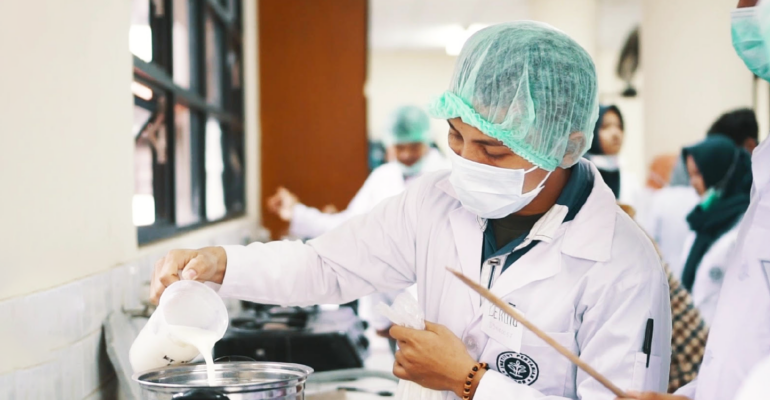Want to Know What the Graduates of IPB University’s Animal Production Technology Study Programme Can Be? Check Out This Following Info!

The Animal Production Technology (TPT) Study Programme is an undergraduate education programme at the Department of Animal Production Science and Technology (IPTP), Faculty of Animal Science (Fapet) IPB University. Are you curious about what you will learn and the career prospects of graduates from this study programme? Let’s take a look at IPB University’s Animal Production Technology Study Programme!
What is the Curriculum Like?
The education carried out in the Animal Production Technology Study Programme of IPB University applies a curriculum that contains the principles of welfare, preservation of genetic resources and the environment. This study programme emphasises the ability to apply, develop and create knowledge in the field of livestock production for the needs of society.
The competence of graduates is to be able to plan, implement and develop livestock businesses, master production technology and waste management, and be able to handle and process livestock products.
What do you learn?
Students learn and practice livestock handling techniques, how to maximise livestock productivity, and the use of modern livestock technology. Not only in class, students also learn directly with farmers in the barn.
“We can synchronise the theories we learn during lectures and the situation in the field. Students complement each other with farmers. Farmers provide information to students, students provide input to farmers based on the theory of the knowledge that has been learned during lectures,” said Wartini, TPT IPB University 8th semester student.
Before graduating, students have also been prepared to think broadly about how to build a real farm. This was learnt in semester 5 in the Broiler Ruminant Farm Design course. In this course, students are divided into several groups according to their livestock commodities.
“For example, group one designs a farm for cattle with a population of 1,000 heads. So we make the design of the cage, where it is located, how much feed it needs, and what the population projection is,” said Wartini.
In addition, in the Tropical Integrated Farming course, TPT IPB University students learn how to build an Integrated Farming System that integrates agriculture, livestock and fisheries activities. For example, cattle manure can be used to fertilise crops and the crops can be sold.
Students do not only learn about livestock production. With the 2020 Curriculum (K-2020), students can take courses across study programmes, for example learning about nutrition and livestock products through the Supporting Course (SC). That way, TPT students can learn animal sciences from upstream to downstream.
How is the Accreditation?
This study programme has been accredited nationally by the National Accreditation Board for Higher Education (BAN-PT) and internationally by The Accreditation Agency for Study Programmes in Engineering, Informatics, Natural Sciences, and Mathematics (ASIIN).
What Can Graduates Be?
The job opportunities for TPT graduates are very wide. Graduates can become entrepreneurs who focus on livestock cultivation, distribution, and marketing. They can also work in private companies in livestock breeding, livestock product processing, slaughterhouses, livestock product retail, animal quarantine, quality analysis study bodies, livestock business analysts, and livestock journalists.
Job prospects for TPT graduates are also open in central and regional government agencies that deal with animal sciences. Another option is to become a lecturer or researcher in animal sciences. (MHT/Rz) (IAAS/RUM)



